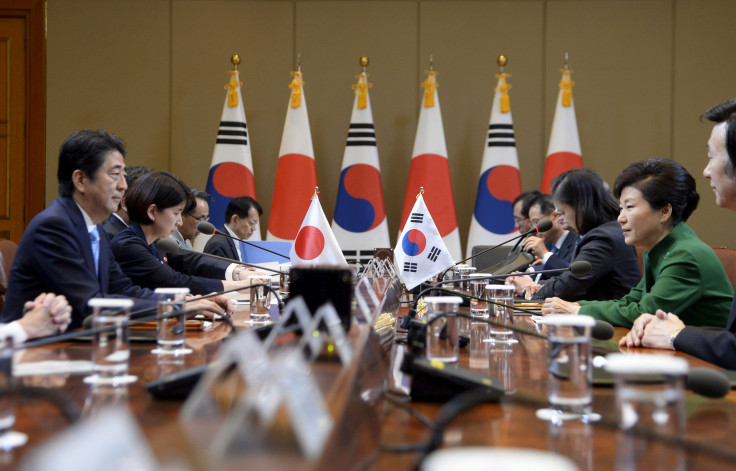'Comfort Women,' Pyongyang's Nuclear Program Top Agenda As China, Japan, South Korea Leaders Hold First Summit In Years

The leaders of Japan and South Korea met for the first time since they took office more than two years ago, agreeing to try to resolve the dispute over the so-called "comfort women," whom Japanese soldiers used for sex in World War II. The dispute has spoiled relations between the U.S. allies at a time when Washington may need help in meeting China's attempts to expand its influence in the region.
"Regarding the issue of "comfort women," I believe we should not leave behind difficulties for future generations as we try to build a future-oriented cooperative relationship," Reuters reported Japanese Prime Minister Shinzo Abe as saying after meeting with South Korean President Park Geun-hye in Seoul Monday. "We've agreed to accelerate talks for the earliest possible resolution."
"I hope today's summit will heal the bitter history in a broad sense and be a sincere one and an important opportunity to develop the two countries' relationship," Park said before the meeting, according to Reuters.
While Japan cites the 1965 treaty re-establishing diplomatic ties between the two countries and a 1993 apology, later South Korean leaders have said these haven't gone far enough and that Japan has even undermined its own statements.
The Japan-South Korea meeting followed the first East Asia Summit -- between China, Japan and South Korea -- in three years on Sunday, also in Seoul. The three agreed to push for the resumption of the so-called six-party talks aimed at ending North Korea's nuclear weapons program, the Financial Times reported.
The three countries also said they would push for a free trade pact among them, encompassing 20 percent of the world economy, and China's Regional Comprehensive Economic Partnership plan, a bigger 16-nation free trade zone that could rival the U.S.-backed Trans-Pacific Partnership, the FT said.
Aside from them, the other parties to the talks, which were suspended in 2009, are the U.S. and Russia. The U.S. and South Korea signed their own plan to detect, disrupt and destroy North Korean nuclear and biochemical arms, Bloomberg reported.
U.S.-China frictions include the U.S.'s attempt to block another China project, the Asian Infrastructure and Investment Bank, and their recent dispute over China's activities in the South China Sea.
© Copyright IBTimes 2025. All rights reserved.





















